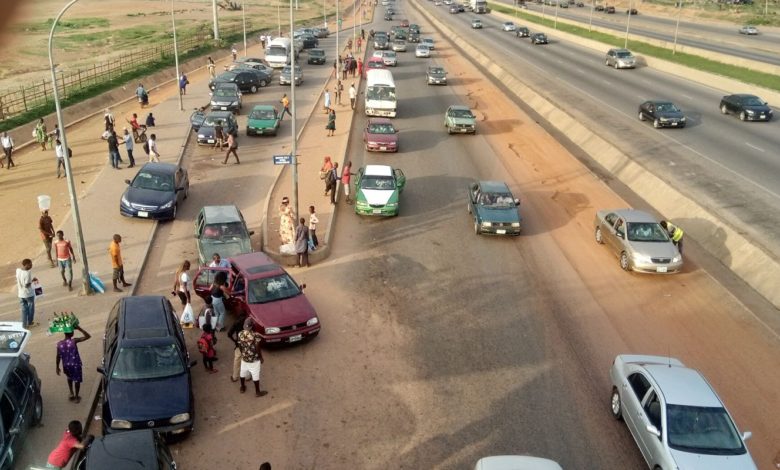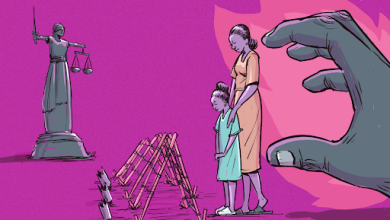#BreketeFamily: How Nigerian Radio Show Has Built A Tribe Of Taxi Drivers
Beyond the studio of the popular human rights radio show, Brekete Family, there is a growing community of white and blue-collar workers, particularly taxi drivers, who owe their source of livelihood to the programme.

In 2017, Joshua Anyoha, a graduate of Lagos State University, lost his job. From then, he struggled to make a living as a real estate agent, dabbled into car dealerships, and anything legal he felt could put food on the table for his wife and three children.
But the economy was hard and life remained difficult. To make matters worse, Anyoha had no savings from his previous job as an Information Technologist.
Then in early 2021, a brother advised him to seek out the Brekete Family, a community that evolved around a popular radio show founded by Ahmed Isa, also known as Ordinary President.

The open-air office
“Since I was already a good driver, I visited the Brekete Family Taxi office at Zone One,” Anyoha tells HumAngle.
Located at Wuse Zone One in Abuja, the office is a wide space with only a makeshift shelter and a row of Brekete taxis parked. Painted chiefly in white, unlike other commercial cabs that have a dominant green colour, the taxis stand out in the Federal Capital Territory (FCT).

Here, drivers have their cars assessed consistently. It also serves as a place to socialise. It is where Anyoha got his application form.
One of the requirements he had to fulfil included providing two level-eight guarantors in the Nigerian civil service. Then he was to make a basic payment of N50,000, to be refunded at a later date.
“There were other miscellaneous expenses that put everything at about N68,000,” he adds.
Anyoha’s arrangement is categorised as hire-purchase, where he is expected to make a weekly remittance of N20,000. His car is valued at N2.5 million.
“I was given a period of 38 months,” he explains. “Within this time, I am expected to have completed the payment and the car becomes mine.”
Another category is the daily payment type where drivers like John Changtung make a basic payment of about N40,000 and subsequently remit N3,000 daily, after securing their taxi.
Married with five children, Changtung used to drive a taxi for his boss until they parted ways. “The car needed a new engine and he was unable to buy one after I made the request,” he explains.

Changtung’s life took a turn for the better since he was given the Brekete Family taxi. ”Now I look good compared to how I once looked,” he says. “I have my own taxi and nobody bothers me.”
Anyoha, on the other hand, views getting a car as the grace of God, because he knew no one who could influence his application for a vehicle. He recalls how he was asked to choose among four cars. This was after passing the driving test, and in less than 48 hours, he was driving his own car.
The dynamics
In Abuja today, four passengers sit in the back, and sometimes two in the front passenger seat of a taxi meant for a maximum of four people besides the driver. Sometimes the drivers insist on the overload. At other times the passengers do because there aren’t enough cars to easily cater for everyone.
But the city has always had a transportation problem, which was one of the reasons the Abuja Urban Mass Transport Company Limited was established many years ago.
This effort has, however, proven insufficient, particularly when the FCTA in 2013 banned other commercial buses, popularly known as Araba, from plying routes within the city centre.
Wheels of change
According to a March 15 report by Bloomberg, Nigeria’s unemployment rate rose to 33.3 per cent, the second-highest globally, in 2021.
However, Nigerians like Anyoha have a different story to tell after getting taxis from the Brekete Family initiative.
Anyoha points out that he feeds well now and is able to take care of his family’s needs. On weekdays he makes a minimum of N10,000 per day and at least N5,000 on other days.
As long as his car is in good condition, Anyoha does not find it difficult to meet up with his weekly remittance.
One of the conditions Brekete Family also gives is that drivers keep their cars in excellent condition. Every one of them submits his vehicle for inspection weekly.

Out of every 10 taxis on Abuja roads, one arguably has a crest that reads Brekete Family Taxi today, with a four-digit number that shows how many cars have been given out so far. Anyoha’s car was 1,435 at the time it was issued to him in February 2021 and, at the time this report was filed, over 1,600 Brekete cars had been given out.
HumAngle was unable to confirm the exact number of beneficiaries from the Brekete Family taxi association and if there are defaulters who do not make their periodic remittances or others who disappear after getting their cars.
U-turn
Many taxi drivers in the city who have a functional car radio, tune in to Human Rights Radio to listen to Brekete Family. So, it was a shock to some of the drivers when the controversy over Isa hitting someone grew wings.

Brekete Family became popular for the way it draws attention to and responds to human rights abuse. Unfortunately, Isa, the founder and host found himself in hot waters after a British Broadcasting Corporation (BBC) Africa Eye documentary showed how he assaulted an interviewee who had lit fire to her niece’s head. This led to the suspension of Isah’s license for 30 days, effective May 31, until “the broadcaster commits to ethical and professional broadcasting.”
Now strictly online
Some taxi drivers believe that Isa is being targeted because he fights for the masses, while others feel that since he had shown remorse for his actions, NBC should waive its suspension.
Others, like Ndubuisi Nwokoro, are ready to go to the streets in protest. “If he had allowed the masses to protest, the road in Abuja would have been closed,” he says. “When a serving senator assaulted a woman in a sex toy shop, what happened to him? When a sitting judge slapped somebody in Banex, what was done to him?”
“We are waiting to see what will happen. We are angry.”

Another taxi driver, Muhammed Abdullahi, pointed out that the masses would suffer because they benefit the most from the programme and are less likely to have access to the internet or own an android phone.
Despite the suspension, fans of the radio show, particularly taxi drivers, still listen with their phones connected to their car radio, HumAngle observed.
The show currently has over 87,000 subscribers on YouTube and its June 1 Livestream recorded 16,288 views.
Support Our Journalism
There are millions of ordinary people affected by conflict in Africa whose stories are missing in the mainstream media. HumAngle is determined to tell those challenging and under-reported stories, hoping that the people impacted by these conflicts will find the safety and security they deserve.
To ensure that we continue to provide public service coverage, we have a small favour to ask you. We want you to be part of our journalistic endeavour by contributing a token to us.
Your donation will further promote a robust, free, and independent media.
Donate HereStay Closer To The Stories That Matter




